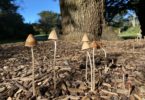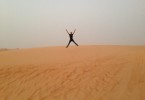The secret to life is to die before you die and find there’s nothing to be afraid of.
– Eckhart Tolle
What if this were your last year to live?
Would you go out and party, travel the world, do all kinds of things you’ve always wanted to explore but were afraid to do? Would you spend more time with your family and friends, perhaps be in nature more often? Or would you keep living exactly the way you have been?
We may not even have the answer, but it is the question that cuts to the core of our existence here, for it asks what it means to be happy and at peace. Our culture frowns upon death, and we’ve conditioned ourselves to look the other way whenever this most universal and natural event we all share comes up in conversation, but as Keith Olberman recently said so passionately in his special comment about his ailing father, when we’re talking about death what we’re really talking about is life.
Enter A Year to Live.
Based on a book by poet and teacher Stephen Levine, study groups have sprung up around the country in which people come together with a hypothetical date of their passing in mind, sharing their experiences of what it would be like to have only one more year to live. I first heard about it when my friend Johnny did it here in the Bay Area a couple of years ago, an experience that seemed profound and transformational, to say the least. It entered my sphere again a few weeks ago when Barb, an old friend of Deb’s, visited from New York, announcing she had just embarked on that same journey. (The two of them got to meet, with Johnny perhaps delivering the most poignant line of the weekend: “Congratulations on your diagnosis!”)
As this visit was a sort of a “beginning of the end” for her, the weekend took on a slightly more immediate feeling, though wrapped in an almost timeless gypsy-like abandon. These two descriptions may seem paradoxical, but I think it was our “driftyness” that brought a lot of focus and attention to what was important: the experience itself. Without any schedule or plan it felt as if we were just more able to be in the present moment and enjoy each other and the things we encountered.
 It was interesting that without much thinking we were drawn to fresh air, whether it was a stroll through the botanical gardens, a hike along Lands End, or wave watching on the beach. There’s something simple and profound in nature, something that cannot be described in words, inviting you to turn off your brain, take a deep breath and forget about anything but the present moment.
It was interesting that without much thinking we were drawn to fresh air, whether it was a stroll through the botanical gardens, a hike along Lands End, or wave watching on the beach. There’s something simple and profound in nature, something that cannot be described in words, inviting you to turn off your brain, take a deep breath and forget about anything but the present moment.
 If I had to sum up the weekend in three words, I’d say we had good food, good laughs, and good conversation. Nothing particularly revolutionary, but a helpful reminder of what makes our heart bounce and our soul dance, nonetheless. And in the grand scheme of things that might ultimately be all the universe is asking of us. If nothing else, it feels like a good entry point into the world we all come from and will eventually all return to.
If I had to sum up the weekend in three words, I’d say we had good food, good laughs, and good conversation. Nothing particularly revolutionary, but a helpful reminder of what makes our heart bounce and our soul dance, nonetheless. And in the grand scheme of things that might ultimately be all the universe is asking of us. If nothing else, it feels like a good entry point into the world we all come from and will eventually all return to.
One of the “heady” things we did do was set up a blog for Barb to share her “last” year with the rest of us. She’s been blogging for a few weeks now and I’m delighted to say that it has brought me great joy and inspiration to read her observations and follow her “decline.” Sounds a bit morbid, I know, but there’s actually a lot of beauty and joy emanating from her words, as if indeed her “diagnosis” were a blessing. Her blog so far has run the gamut from legal aspects of dying to Buddhist contemplations to reflecting on her friends and family.
I’ll leave you with an excerpt from perhaps my favorite posting so far, a living will written by her friend’s aunt Vivian Shaw who passed away in 2006. It’s worth reading her whole Personal manifesto on death, but I’ll leave you with one section that gets straight to the heart of it all:
Beliefs
I “believe” that we are in the universe as the cells in our bodies are in us. There is a time to be born and a time to die. All sentient beings contain within themselves the seeds of their own dissolution.
Life and death are not opposites. Birth and death are two “ends” of a transitory continuum. Death is built into the nature of biological life with the same care as birth.
We are here for a brief flash in the spectrum of time. Then, we merge again with the mystery of “Being.” Although we relinquish our separateness, we remain – in some way – a part of the mystery.









The power of your words are always great, but the strongest things in the post for me, at least, are these photos. Each one is filled with significance to key moments and themes that made that weekend with Barb one of the most amazing and magical and transformative weekends I’ve ever spent with a friend. I sit here and type with tears of joy and gratitude streaming down my cheeks. To you, to Barb, to life itself.
It was such a joy to see two old friends connecting like that. And I felt so much part of it, like I was swimming in the fish tank with you. And the photos, well, you know who I’ve learned that from 😉
It doesn’t feel right we are so far away. You both make me smile and cry at the same time.
It’s been too long Kathryn. It would be so nice to see you and Scott in the “real world.”
The line ‘ when we’re talking about death what we’re really talking about is life’ really got my eyes wide … Yep it’s absolutely true!
The Lifestyle Test
How do you live your life?
http://www.3smartcubes.com/pages/tests/lifestyle-test/lifestyle-test_instructions.asp